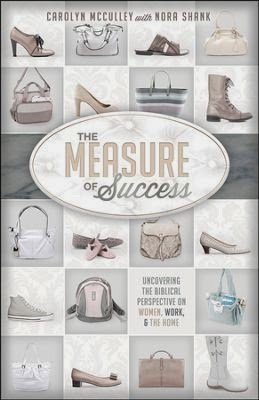Q&A with Carolyn McCulley: On Women, Work, and the Home

I'm happy to have as my guest today Carolyn McCulley, author of The Measure of Success: Uncovering the Biblical Perspective on Women, Work and the Home:
Welcome, Carolyn! Your book is about work, success, and family life as a woman. And you’re not afraid to say, “Yes, women should work.” Tell us what you mean by that.
Should women work? Absolutely! Women should work and work hard every day. The Bible calls Christ-following women to work for the glory of God. But the location where we work is neither the definition nor the measure of our success. I think it’s no surprise that far more verses in the Proverbs 31 portrait of a successful woman are about productivity and financial management than relationships. In the biblical narrative, work is a co-labor of love, tasks done in partnership with a gracious God who uses our labors to bless others. In response to criticism that He healed a sick man on the Sabbath, Jesus said, “My Father is working until now, and I am working” (John 5:17 ESV). His work was to glorify His Father and help others. Ours is the same.
Why do you think there is so much controversy, not just in the church, but also in society, about whether or not women should work outside the home?
There’s always a new controversy erupting. As I was working on this book, one top technology executive was rounding the speaking circuit telling women how to be more ambitious. Another top technology executive built a nursery next to her office and returned to work after a mere two-week maternity leave. Then she ruffled the “sisterhood” by recalling the work-at-home privileges for her employees. A third woman, a successful professor, published an article seriously skewering the idea that women can have it all. Each time, factions from multiple perspectives fired warning shots into the blogosphere that these were untenable ideas. Individual skirmishes in the “Mommy Wars” always have collateral damage—wounding weary women who are trying to do the best they can with the resources, opportunities, and responsibilities that they have. We need perspective.
So you wrote this book as a way to offer some perspective…
 Absolutely. I am passionate about calling out “facts” that don’t line up with the grace, mercy, and freedom offered to us in the gospel of Jesus Christ—especially for those who have never heard that good news! That’s why I wanted to write this book: to help women in all stages of life think clearly about the God-given gifts and opportunities they have, and how to invest those individual and specific situations in light of eternity. What we really need to know is the purpose of work or how to think about the multiple facets of productivity that make women’s work different from men’s. This isn’t a new idea. What we really need are timeless wisdom principles straight from Scripture.
Absolutely. I am passionate about calling out “facts” that don’t line up with the grace, mercy, and freedom offered to us in the gospel of Jesus Christ—especially for those who have never heard that good news! That’s why I wanted to write this book: to help women in all stages of life think clearly about the God-given gifts and opportunities they have, and how to invest those individual and specific situations in light of eternity. What we really need to know is the purpose of work or how to think about the multiple facets of productivity that make women’s work different from men’s. This isn’t a new idea. What we really need are timeless wisdom principles straight from Scripture.
We should think as recipients who will one day give an account for how we managed what we were given. We are stewards of all that we have received, including our relationships. It is God who gives us the relationships, children, time, talents, interests, opportunities, and tasks that fill our days and years. We may be wives or mothers, but as important as these are, they are roles that end in this life. We continue on into eternity as children of God and sisters to those who have been rescued by Christ. We may work in highly esteemed professions or we may not be paid for our daily labors. Those roles are not our identities, either. They are merely opportunities to be invested for the glory of God. Those things God gives us in terms of relationships and opportunities, He wants multiplied for the sake of His kingdom. That’s the true measure of success.
Many hold up the Proverbs 31 woman as the ideal. Do you think that's wrong?
Not completely. But the most important thing you need to know about this Old Testament “superwoman” is that she never existed. Found at the conclusion of the Old Testament’s book of wisdom, she is only an archetype of what an excellent woman looks like, a compilation of fruitful activity in various seasons of life. Though we might think we know the Proverbs 31 woman well, once again we need to dust off our notions of her and examine this tribute closely to “reveal” what we can learn from her. This poetic tribute is a jumble of feminine qualities—addressing relationships, productivity, fruitfulness, and financial savvy—with only one short verse about beauty. It’s easy to overlook the fact that this chapter has a lot more to say about her work than anything else. This virtuous woman is praiseworthy because she has “done excellently.” It’s her hard work that earns her commendation. Motivated by a love and respect for the Lord—her crowning virtue—her work is fruitful, praiseworthy, and excellent. The fruit of her diligent labors marks the final sentence in this Old Testament book of wisdom.
You go back even further into the Old Testament to find the purpose of our work...
Yes. In Genesis. In the very first action word that follows the creation of mankind, we find our purpose: to fill and subdue the world. Not like some monarch who issues impossible demands so that all her servants scurry to accomplish her will. We are created to subdue, or rule over, the world so that our labors imitate our working, creative God. Verse 28 expands clearly upon that concept with this command—given to both male and female—“be fruitful, multiply, fill the earth, and subdue it.” In the paradise God created, human beings were designed to work and it was called very good. Work is how we imitate God. “When God created people and placed them in a perfect garden, work was part of his provision to give life meaning,” theologian Leland Ryken writes. “It can still have that purpose today.”
You encourage readers by saying that God gives us the grace we need to transform our daily work right now. How does he do that?
God transforms our work by first transforming us. This is the effect of the gospel on our work: God gives us hope that He can take our less-than-perfect attitude about work and sanctifies it, all because we are united with Christ. He takes what we have (which isn’t much) into His perfection, giving it all the qualities we don’t possess. Knowing this helps us to avoid segregating work into secular and sacred categories—for to God, all work is a sacred calling. It’s important to remember that God is working through you even in the most mundane tasks. The antidote to this feeling of meaningless is remembering that our Creator has given dignity to our work.
Do you think Mary and Martha's story is relevant for today's woman, and if so, why?
Yes. First, no husbands were mentioned for either of these women. No children were mentioned, either. Perhaps they had them once. Perhaps they would have them in the future. But also, no mention was made of their social status, either by wealth or social connections or job skills. Their one identity that was most important was the one that would exist forever: a follower of Christ. This is the identity we need to affirm among ourselves, not the labels that come with the kind of labor we do. As Christians, we are to be grounded in this identity, even as we add other roles and ways to express that identity in relationship to others. We might have an interesting job for a season. We might be married for a season. We might have children at home for a season. But those things can be taken away from us or never given to us at all. They are gifts for this life only.
For many, ambition—especially in women—is a negative word. But you think otherwise…
We all want something. That’s the drive behind ambition. The truth is that we were actually created to be this way. God has made us to be people who have desires. Jesus knows we have desires. This is why He came to earth. Sin corrupted our drive and our desires. Jesus came to redeem that brokenness and to give us renewed desires. He doesn’t tell us to quit being ambitious. He just tells us to quit being fools amassing useless junk like those poor souls featured on a hoarders program. Go for the gold, Jesus says, the real gold.
There are women who are trying to do it all, balancing work and home life. How would you encourage them today?
First, the work you are doing has eternal significance so don’t give up. If you are raising your children to fear the Lord, then you have already given them an incredible inheritance. Second, remember that your sacrifices will be rewarded: “So don’t throw away your confidence, which has a great reward. For you need endurance, so that after you have done God’s will, you may receive what was promised” (Heb. 10:35–36, emphasis added).
You liken the woman in mid-life to a head coach—as one who helps others achieve success.
As a midlife manager, mother, or wife, you job can be described as coaching others to greatness. At home or at work, you are building a team—and the required skill sets are extraordinarily similar. A good coach of either gender is supposed to call forth the best possible qualities and performances of his or her team by providing the resources, tools, and guidance needed to achieve concrete and specific goals. Management is really a form of serving—meaning it is directed at making others the best they can be in order to achieve a larger goal. As Christians, we shouldn’t be looking to achieve a certain level of success just to impress others or win lots of awards; instead we should be asking and praying for the kind of success that draws people to the steadfast love of God. This is the head coach’s ultimate mission and He defines a successful team by this benchmark.
